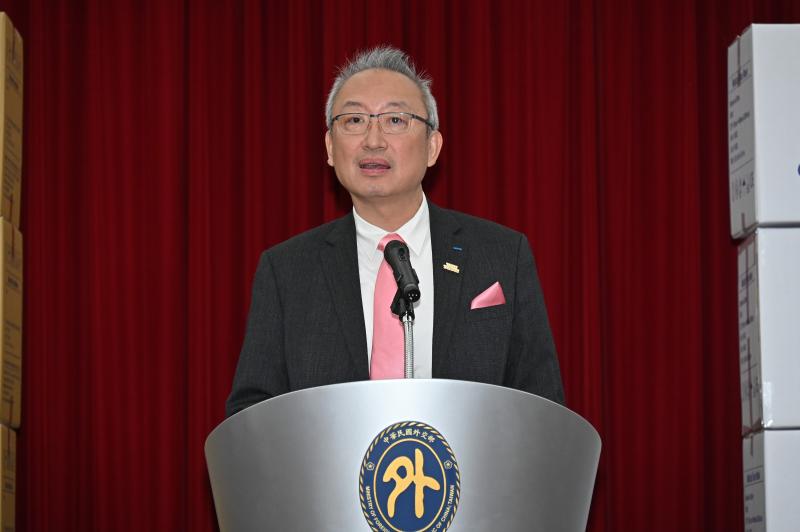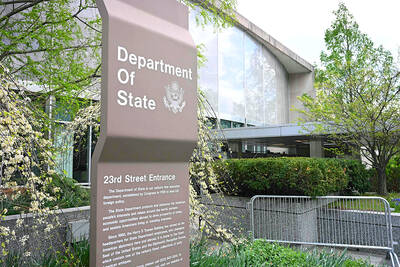Taiwan is seeking closer security ties with the US and would look to buy more weapons from Washington, Deputy Minister of Foreign Affairs Francois Wu (吳志中) said yesterday.
“I believe there is a way to have a closer security relation, unofficially, with the US,” Wu said in an interview. “We are praying to do that and it will also be sending a message to China not to touch Taiwan so easily.”

Photo: Tu Chien-jung, Taipei Times
President William Lai (賴清德) last month announced that Taiwan would raise its defense spending to more than 3 percent of GDP.
The move comes after US President Donald Trump said during his election campaign last year that Taiwan should pay for US protection and spend 10 percent of GDP on its military.
“In increasing our defense budget, certainly the consequence is to buy more American weapons because Europeans don’t want to sell us weapons,” Wu said from his office in Taipei. “Even Japan is very careful about this.”
Wu added that unlike the dramatic fallout between Trump and Ukrainian President Volodymyr Zelenskiy after their disastrous meeting in the White House last week, such a situation would never happen between Taiwan and the US.
“If it is possible that our president meets the president of the US, it will be considered a very positive and diplomatic” event, he said.
High-level meetings between Taiwan and the US would be very sensitive and unlikely.
Asked about the US push for stricter semiconductor export controls against China and the possible impact on Taiwan Semiconductor Manufacturing Co (TSMC), Wu said Taiwan does not have the capability to oppose a decision made by the US.
“We just need to adapt to it,” he added.
The US earlier this year unveiled new rules aimed at preventing advanced chips from TSMC and other companies from reaching China.
The measures require chipmakers to tighten their scrutiny of customers, especially Chinese firms, following an incident where TSMC-made chips were secretly diverted to the blacklisted Huawei Technologies Co.
While Taiwan is building its own submarines and warships, Wu ruled out more drastic measures such as developing nuclear weapons, as that would give China a reason to attack.
“Every message that we are sending to the world on China is that we will not give you an excuse to attack Taiwan,” Wu said. “The goal is to make sure that every day that the Chinese president wakes up and is shaving he says: ‘OK, I want to conquer Taiwan to be the greatest emperor of China, but not today.”

Hong Kong singer Eason Chan’s (陳奕迅) concerts in Kaohsiung this weekend have been postponed after he was diagnosed with Covid-19 this morning, the organizer said today. Chan’s “FEAR and DREAMS” concert which was scheduled to be held in the coming three days at the Kaohsiung Arena would be rescheduled to May 29, 30 and 31, while the three shows scheduled over the next weekend, from May 23 to 25, would be held as usual, Universal Music said in a statement. Ticket holders can apply for a full refund or attend the postponed concerts with the same seating, the organizer said. Refund arrangements would

Former president Tsai Ing-wen (蔡英文) on Monday called for greater cooperation between Taiwan, Lithuania and the EU to counter threats to information security, including attacks on undersea cables and other critical infrastructure. In a speech at Vilnius University in the Lithuanian capital, Tsai highlighted recent incidents in which vital undersea cables — essential for cross-border data transmission — were severed in the Taiwan Strait and the Baltic Sea over the past year. Taiwanese authorities suspect Chinese sabotage in the incidents near Taiwan’s waters, while EU leaders have said Russia is the likely culprit behind similar breaches in the Baltic. “Taiwan and our European

Taiwanese indie band Sunset Rollercoaster and South Korean outfit Hyukoh collectively received the most nominations at this year’s Golden Melody Awards, earning a total of seven nods from the jury on Wednesday. The bands collaborated on their 2024 album AAA, which received nominations for best band, best album producer, best album design and best vocal album recording. “Young Man,” a single from the album, earned nominations for song of the year and best music video, while another track, “Antenna,” also received a best music video nomination. Late Hong Kong-American singer Khalil Fong (方大同) was named the jury award winner for his 2024 album

The US Department of State on Monday reaffirmed that US policy on Taiwan remains unchanged, following US President Donald Trump’s use of the term “unification” while commenting on recent trade talks with China. Speaking at a wide-ranging press conference, Trump described what he viewed as progress in trade negotiations with China held in Geneva, Switzerland, over the weekend. “They’ve agreed to open China — fully open China, and I think it’s going to be fantastic for China. I think it’s going to be fantastic for us,” Trump said. “I think it’s going to be great for unification and peace.” Trump’s use of the